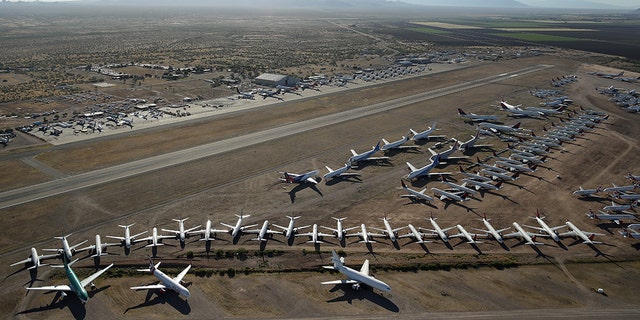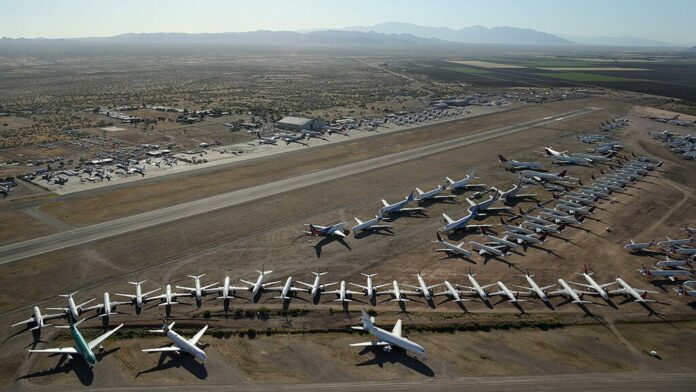Get all the latest news on coronavirus and more delivered daily to your inbox. Sign up here.
Hundreds of commercial airplanes were captured resting at a remote Arizona boneyard this month, their fate uncertain, after the coronavirus pandemic transformed air travel into a skeleton of its former self.
Major airlines, including Delta, United, Jet Blue, and Air Canada have sent aircraft to Pinal Airpark, located in the desert about 90 miles south of Phoenix. Many of the aircraft have never left upon arrival.
“It’s a little eerie,” one major airline pilot said after he flew a jet into the park with only a first officer on board, according to AZ Central.
AMERICAN AIRLINES STILL RUNNING 29-MILE FLIGHTS IN COLORADO BECAUSE OF CARES ACT RULES, REPORT SAYS

MARANA, ARIZONA – MAY 16: Decommissioned and suspended commercial aircrafts are seen stored in Pinal Airpark on May 16, 2020 in Marana, Arizona. Pinal Airpark is the largest commercial aircraft storage facility in the world, currently holding increased numbers of aircraft in response to the coronavirus COVID-19 pandemic. (Photo by Christian Petersen/Getty Images)
“At the same time there’s a profound sense of sadness that goes along with it because you know why they’re there, and it sort of hits you that this plane you’re flying is not going to be flying again, maybe forever, but certainly not for a long time. You know this is affecting people’s lives, and that definitely hits you a bit.”
The ‘boneyard’ is normally home to retired commercial and military aircraft. Due to the lack of travel, major airlines have flown in huge portions of their fleets for the foreseeable future.
Delta, the largest American airline in terms of revenue is storing about half its fleet, corporate spokeswoman Maria Moraitakis told AZ Central.
At least 50 of its planes are being grounded at the airpark described as the largest commercial aircraft storage facility in the world.
Within the last 10 days, more than 50 jetliners made final flight plans to the converted World War II training base, where the dry desert air helps prevent them from weathering during their lack of use amid the coronavirus pandemic, according to the paper.
Since Feb. 20, airline passenger traffic is down roughly 95 percent, and stocks have lost over 60 percent of their value.
On May 17 last year, the Transportation Security Administration (TSA) screened 2,620,276 people in the U.S. On Sunday those numbers were at 253,807. It’s a major reason why airlines are storing their aircraft instead of having empty planes in the sky.
OVERSIGHT COMMISSION FINDS CORONAVIRUS RELIEF FUNDS HAVE NOT YET BEEN DISTRIBUTED TO AIRLINES
“At the same time there’s a profound sense of sadness that goes along with it because you know why they’re there, and it sort of hits you that this plane you’re flying is not going to be flying again, maybe forever, but certainly not for a long time,” the pilot said, according to the paper. “You know this is affecting people’s lives, and that definitely hits you a bit.”
He added that the airpark has no air traffic control tower and no landing lights or visual approach indicators. It covers an area of roughly 2,080 acres and its single runway measures nearly 7,000 feet long.
Airline companies have placed about 250 planes in storage at the airpark since March, and it’s currently running at around 85 percent capacity, according to Scott Butler, the chief commercial officer of Ascent Aviation Services, which operates the Pinal Air Park runway and storage operations.
CLICK HERE FOR MORE CORONAVIRUS COVERAGE
Butler said the company was operating at about 30 percent capacity prior to the outbreak, according to the paper.






